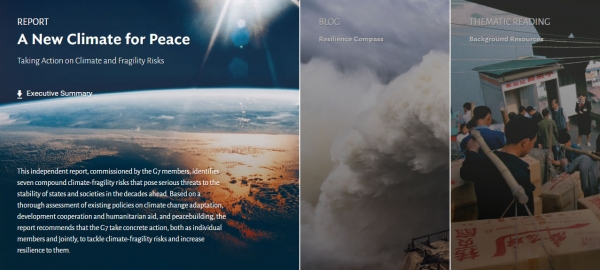G7 report: Making climate change and fragility a foreign policy priority
Friday, 17 April, 2015 - 10:02

At the close of the Meeting of G7 Foreign Ministers in Lübeck today, the Ministers announced a stronger collective commitment to tackling the climate-related risks faced by weak states. This follows the presentation of an independent report – A New Climate for Peace: Taking Action on Climate and Fragility Risks – to the German Foreign Minister Frank-Walter Steinmeier by the consortium lead adelphi. In the report by adelphi, the European Union Institute for Security Studies (EUISS), International Alert and the Wilson Center, the authors recommended concrete actions that foreign ministers can take to increase the resilience of weak states, delivering peace and security across the globe.
Today, the G7 Foreign Ministers welcomed the report in the final communiqué and agreed with the conclusion that there is a need to better integrate climate-fragility considerations across foreign policy portfolios. To this end, the G7 “decided to set up and task a working group with evaluating the study’s recommendations.”
"A New Climate for Peace" is an independent report commissioned by members of the G7 Member States. The report identifies seven compound climate-fragility risks that pose serious threats to the stability of states and societies in the decades ahead. Based on a thorough assessment of existing policies on climate change adaptation, development cooperation and humanitarian aid, and peacebuilding, the report recommends that the G7 take concrete action, both as individual members and jointly, to tackle climate-fragility risks and increase the resilience of states and societies to them. Stakeholders across five continents have engaged in discussions on risk perception, preventive policy approaches and strategies as part of a series of dialogues and consultations. The results of this process are also part of the study.
Please find the Executive Summary of A New Climate for Peace: Taking Action on Climate and Fragility Risks here: www.newclimateforpeace.org
"A New Climate for Peace" is an independent report commissioned by members of the G7 Member States. The report identifies seven compound climate-fragility risks that pose serious threats to the stability of states and societies in the decades ahead. Based on a thorough assessment of existing policies on climate change adaptation, development cooperation and humanitarian aid, and peacebuilding, the report recommends that the G7 take concrete action, both as individual members and jointly, to tackle climate-fragility risks and increase the resilience of states and societies to them. Stakeholders across five continents have engaged in discussions on risk perception, preventive policy approaches and strategies as part of a series of dialogues and consultations. The results of this process are also part of the study.
Please find the Executive Summary of A New Climate for Peace: Taking Action on Climate and Fragility Risks here: www.newclimateforpeace.org
Work regions:
Mountain Ranges:
Location Country:
Germany
Files:

Facebook comments